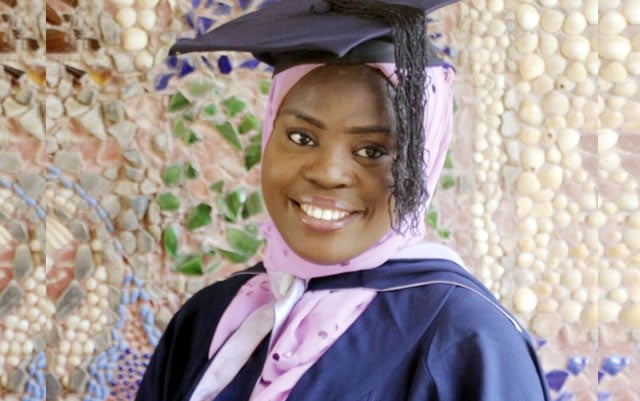Raheemah Arogundade, 23, graduated with a first-class degree from the Department of English, Obafemi Awolowo University, Osun State after a long hiatus during which the department failed to produce a first-class graduate. In this interview with TUNDE AJAJA, she talks about what this achievement means to her
English is one of the courses people believe are difficult for students to have first-class grade, was it that difficult for you?
In line with what they say that good things don’t come easy, I would say the same applied in our case. To have graduated with a first-class degree was not so easy, particularly in a university like Obafemi Awolowo University. I had to let go of some things and put in a lot of efforts. Typically, I read for long hours in the library, organising discussions, attending tutorials and participating in other extracurricular activities. Combining all these made me have less time for social activities, but I had a great support system – family and friends – that understood me and my goals.
Before you got into the university, did you have your eyes on the first-class grade?
I have been brought up right from childhood to always aspire to achieve excellence. My parents ensured that their children realise the values and opportunities available through education. I already had a good foundation and I remember graduating as the best arts student in my secondary school, Federal Government Girls College, Ipetumodu. So, before I resumed at OAU, I aimed for excellence.
It’s the first time in years that your department would produce a first-class graduate. Was it your plan to change the narrative?
When I got admission to study at OAU, I heard that the department had not produced a first-class graduate in a long while. I was surprised and at first, I didn’t believe it. I assumed it was just one of the many rumours people shared to discourage new students. With time, I realised it was true. So, I had a strong will to break the record. I must say it wasn’t easy. I remember reading so hard in my first year, only for some people to make comments like ‘the highest grade you can have is a second-class upper division, so don’t stress yourself’. The truth is that students hear a lot of discouraging comments, but I was careful to sieve things I heard and hold on to the important ones. I was also careful not to let people’s thoughts derail my focus. So, I worked tirelessly to achieve this feat and God complemented my efforts.
What was your performance like at the beginning?
I knew what I wanted so I knew that the best thing to do was to get it right from the beginning. Also, my parents wouldn’t let me off without lecturing me on how to live on campus and cope with studies. Notably, my parents would talk about my previous academic achievements as a way of encouraging me to do better. So, I knew there was no room for mediocrity. Bearing all these in mind, I settled down fast and serious academic work began in earnest for me. I started having grades that would make me graduate with a first-class degree right from my first semester and that happened all through to the last semester; my GPA never fell below 4.50. I believe we all have a choice to uphold or ignore people’s doubts about our goals in life because people would always have their perceptions and opinions about every venture. But, the choice is ours to make it.
Was it a smooth journey all through?
There were times and days I felt discouraged. Those were days when I would see my result and it would fall below my expectation, knowing how I had channelled all my energy and focus into the exam. However, I also knew that I should never give up. I knew what I was getting myself into when I set the target. So, I was prepared for it. I knew I would never give up on that goal. Anytime I felt low, my family, friends and best friend kept me going. I had a great support system, which is very important. They were always there to motivate me.
How would you describe your educational journey up till the time you entered the university?
In primary and junior secondary schools, I was an average student and it would interest you to know that I was comfortable being average. But before I resumed for senior secondary school education, my dad had a discussion with me, he counselled me and told me to replicate the good results I had in the past. Thus, when I started senior secondary school education at FGGC, Ipetumodu, I had a desire to excel. In addition to that, I was consistently drilled by my teachers and prominent among them were Mr Ayandokun, Mr Adedotun and Mr Odukale. These teachers helped me to harness my academic prowess; they motivated me and prepared me to take on very significant academic tasks. That has been very useful to me till date. My parents also motivated me a lot. In that school, I became a known award winner and the best in my class. I eventually graduated as the best arts student and passed my West African Senior School Certificate Examination, the Unified Tertiary Matriculation Examination and the post-UTME once. I also gained admission that same year.
Till date, many people still ask why people go to study English in the university when we all speak it anyway, what informed your choice?
Actually, I had preference for law at a point but it was a phase that passed. When the admission list was released and I saw that I had been offered English, I was sad. But when I resumed in the department, that orientation changed. I began to see more prospects in the course and learnt closely the innate features of the language. When I tell people I’m studying English Language, it stirs up comments like, ‘oh, English’ or questions like ‘is it not the same English we speak’? But most times when I challenge them and ask simple questions, they usually don’t get them right and they resort into guessing. English Language is broad, but the most common areas are phonology, semantics, grammar, composition and literature. Other important and more intricate areas are pragmatics, semiotics and discourse analysis, stylistics, sociolinguistics, history of English and Nigerian English, psycholinguistics, English for specific purposes, amongst others.
In all the parts of the course you mentioned, what part did you enjoy most and what part did you find difficult?
I didn’t find any aspect difficult; I would say I enjoyed some than others. The courses I enjoyed more in my department were practical courses like pragmatics, semantics, discourse and rhetoric and stylistics. We took courses in other departments such as drama and philosophy. I really enjoyed taking courses in philosophy and my best course there was logic.
Granted that English is not the first language in Nigeria, but there is this notion that there is a high level of mix-up and wrong use of English Language in Nigeria, do you agree with that?
Unfortunately, that notion is true. There is indeed a rampant misuse of words in English Language, superfluous grammatical errors while speaking the language, not to mention the ostentatious pronunciation of words. In addition, people erroneously believe that using highfalutin words equates to having a core understanding and knowledge of English, whereas this is not so. The purpose of speaking is to communicate, and that purpose remains unachieved if the audience cannot understand the speaker. However, learning any language can be a daunting task and the same goes for English. Let’s exclude the fact that we all speak the language; how would you know that what you speak is standard? How would you know that your pronunciation of a word is accurate? Are you aware that there is Standard Nigerian English? The difficulty isn’t in the course itself, it is in language and anyone who has attempted to learn any language would attest to that.
The fact that you graduated with a first-class degree could make some students think that you were always reading. Were you sociable?
I read a lot but it wasn’t as if I read all the time. I had a close circle of friends so my social activities revolved around them. During that time, I belonged to two associations: Drug Free Club and Association of Nigerian Authors. I was also an active volunteer for campus-based projects. In addition, I organised tutorials and taught colleagues within the department. I also took a course in project management while in school. It couldn’t have been all about books. There is a need to always have a balance.
What are your aspirations?
I intend to become an academic, and at the same, I want to be a digital media, marketing and communication expert. At the moment, I have secured admissions in some reputable universities in the United Kingdom, but the reality, (not only in Nigeria) is that opportunities are not so extensive for students in the humanities and arts. Most bodies that give out scholarships prefer to sponsor students in courses that are related to science, technology, engineering and mathematics and this really demotivates students and makes them question the reward system set in place for academic excellence. However, we won’t give up.
If you are to advise students who also desire academic excellence, what would you tell them?
The first thing students have to learn to do is to identify what works for them. Study yourself to know what works for you. For instance, I like to read early in the morning or late in the night, but that might not work for someone else. So, knowing what works for you is important. Also, qualities such as hard work, consistency and planning ahead are very important in achieving success. Prayer is also important; it is important to talk to God about your plans and what you hope to achieve. For example, I would tie my academic excellence to God and my support system, which I mentioned earlier. Beyond these, I feel it’s also important for students to have a deep interest in their course because it is part of what makes students fail. Yes, there are other factors like financial constraints, family issues, learning difficulties, lack of self discovery as regards studying, keeping wrong company, discouraging remarks from people, lack of focus, amongst others, but I feel when you love your course, the influence of some of these other factors would be minimised. I feel it’s also good to have a plan for each semester. I did and it helped. I had a senior colleague I would always meet at the end of every semester to make copies of her notes and materials in order to prepare in advance for the next semester. I attended every class, attended discussions and tutorials, met with lecturers and fellow students when I had difficulty understanding some topics. Also, I ensured that I read all the topics treated in class that same day. And most importantly, I never neglected prayers.
Source: https://punchng.com/students-should-learn-to-identify-what-works-for-them-arogundade-first-class-graduate/








